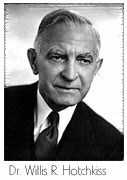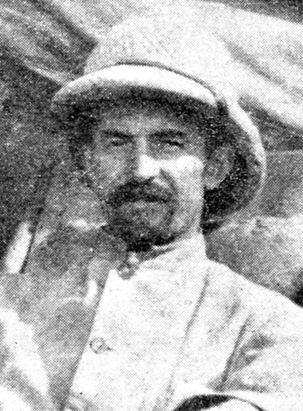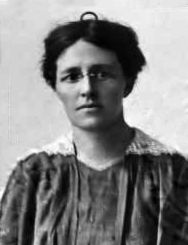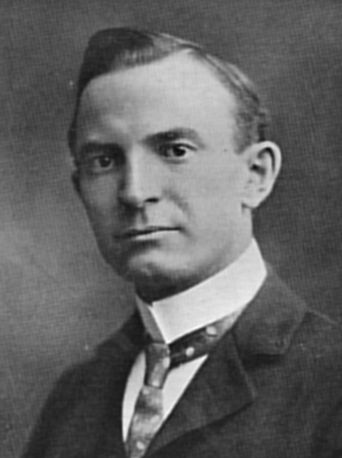Back to search results
Name: HOTCHKISS, Willis Ray (Rev.)




Birth Date: 11 Oct 1873 Doylestown, Ohio
Death Date: 25 June 1948 Cleveland, Cuyahoga, Ohio
Nationality: American
First Date: 1895
Last Date: 1903
Profession: With advance party of Friends' Africa Industrial Mission to Kaimosi. Returned to America in February 1903.
Area: Kilungu, Kisumu, Kaimosi, 1922 Kericho, Hut - 1902 Lumbwa Industrial Mission
Married: 1. In Lucas Co, Ohio 4 Sep 1900 Mathilde Caroline Koehler b. 8 July 1873 Toledo, Ohio, d. 16 Sep 1931 Cleveland, Cuyahoga; 2. In Ripley, New York 12 May 1936 Mary A. Hendrickson b. 12 Aug 1877 Manchester, Ohio, d. 4 May 1958 North Olmsted, Cuyahoga
Children: Willis Livingston (10.12.1901 Cleveland, Cuyahoga-1989); James (b. and d. 1913); David Henry (9.2.1915 Kericho-6 Oct 1993 Cleveland, Ohio)
Author: Sketches from a Dark Continent, 1903; Then and Now in Kenya Colony, 1937
Book Reference: Gillett, Ainsworth, Weller, Tignor, Hut, EAHB 1905, KAD, Red 25, Red 31, North, Drumkey, Red 22, Grasshoppers, EAHB 1906, Red Book 1912
General Information:
North - member of initial AIM party to Nziu, Ukamba 1895; dep. Freretown upcountry 12/11/1895; established station at Kilungu 1898; Visiting Mombasa July 1898; Returned to US to form Friends African Industrial Mission c1900; Kisumu 1902; later opened Industrial Mission in Lumbwa country
Drumkey 1909 - Lumbwa Industrial Mission - Willis R. Hotchkiss, Director and Mrs Hotchkiss
Grasshoppers - originally Secretary of the mission led by Peter Cameron Scott
Grasshoppers - Jacob Toole died followed by Tom Allen. Soon Mrs Allen and Minnie Lindbergh fell ill and Willis [Hotchkiss] struggled with them to the new railway terminus, Kinani, and on to Mombasa where he helped the ladies board a ship. As they drew away from the quay, he painfully recalled disembarking with 15 others two and a half years before; all so full of hope. Now, he only remained. Another distress added to his acute loneliness. He was penniless and in debt. The Coast Agent had been setting funds he received for Willis against a mission debt. The Hotchkiss account stood in the red. Quite apart from the obvious material difficulties, this was a serious matter of spiritual principle. Scott and others had stated at the start that the mission would never appeal for funds (except to God in prayer). Every applicant must accept that ' where God leads, there God feeds. He must be very sure of the former; then he can quietly trust for the latter'. Such confidence in God prohibited debt. Joining AIM Willis had gladly embraced this position. He now felt let down, not by God but by the mission. In fact money, forwarded by the Philadelphia Council, had gone to the Scott family who assumed it was theirs. …. For 7 months Hotchkliss soldiered on alone. Everywhere the unrelenting famine cost lives. He just managed to survive from the game he shot …… As a result of his harsh experience, Willis determined that future mission staff should be largely self-supporting. ….. At last on 8 December 1898, he welcomed visitors from the USA - the new Director, Charles Hurlburt, and a missionary, William Bangert. ….. Initial encouragement turned into keen disappointment. Charles Hurlburt interpreted the financial policy even more strictly than Scott and disagreed with the veteran's new ideas of self-support. History draws a veil over their arguments but the 2 months together could not have been happy for either of them. Willis became more disenchanted with AIM. .. [Hurlburt departed back to the USA] …… famine, smallpox, cattle disease, tribal warfare .. In the midst of the carnage Willis resigned from AIM. No one had proved that God provides for his believing servants in answer to their prayers more than him. But disagreement on this issue led this godly pioneer out of AIM - the last of the first 16.
Red Book 1912 - W.R. Hotchkiss - Kericho
Red Book 1912 - Lumbwa Industrial Mission with Mrs Hotchkiss and Master W.L. Hotchkiss
Red 25 - Chief, Lumbwa Industrial Mission
Ainsworth - on a trip to the Lumbwa country in 1914 - 'Mr & Mrs Hotchkiss were doing good work at the Lumbwa Mission which had a dam and a sawmill.'
Ainsworth - arrived 1895 as part of Mr P.C. Scott's party.
Tignor - resigned when W.G. Bangert replaced him.
Ane Marie Bak Rasmussen, A History of the Quaker Movement in Africa, 1995 One of the mission boards that was later to be incorporated into the American Friends Board of Foreign Missions was the Friends Africa Industrial Mission Board. It was formed on the initiative of a group of students at the Friends Bible Institute in Cleveland, Ohio, who had been inspired by Willis R. Hotchkiss, who had spent four years, from 1895 to 1899, in Ukambani in the eastern part of Kenya with the Africa Inland Mission. His experiences in this mission — which had proved a failure, apparently in large part due to lack of organization and the mission's inability to offer relief during a severe famine in Ukambani — had taught him that a mission in Africa, if it was to be effective, must aim at creating 'a self-supporting, self-propagating native church'.56 The African Church should, in the long run, be able to support itself and not be dependent on aid from the mission organization. Hotchkiss also believed that the ideal way to achieve this aim was for the missionaries to set up an industrial mission where their role would be not only to preach but also to teach the Africans practical skills which could help them to earn an income for the benefit of the Church. An additional argument offered by Hotchkiss in favour of this policy was that although he was convinced that 'what the world needs first and above all is, not changed social conditions, but Christ', he nevertheless believed that, 'there never can be a
real change of heart that is not followed by a radical cleansing of the social conditions which immediately encompass it'." And this 'cleansing' of the social conditions, which he describes in terms such as 'barbarism pure and simple, with its social anarchy, lawlessness, and consequent instability of character',58 could be done precisely through the work of an industrial mission.
When Hotchkiss, himself a Quaker, came home to America in 1899, he first approached the American Friends Board of Foreign Missions in order to seek their support. But at that time they were about to take up new work in Cuba, and were unable to consider work in yet another country. He therefore brought his ideas to Friends Bible Institute in Cleveland, where he had been a student before he went to Kenya, and here he received an enthusiastic response. One of the students there was Arthur B. Chilson, who for some time already had felt a call to go to Africa as a missionary. When Hotchkiss described his plans he immediately joined forces with him, and they travelled around together to all American yearly meetings, gathering support for a mission in Africa. The result was that in 1901 nine yearly meetings formed the Friends Africa Industrial Mission Board, and in April 1902 Hotchkiss and Chilson, together with a trustee of Friends Bible Institute, Edgar T Hole, left for Kenya."
Back to search results




